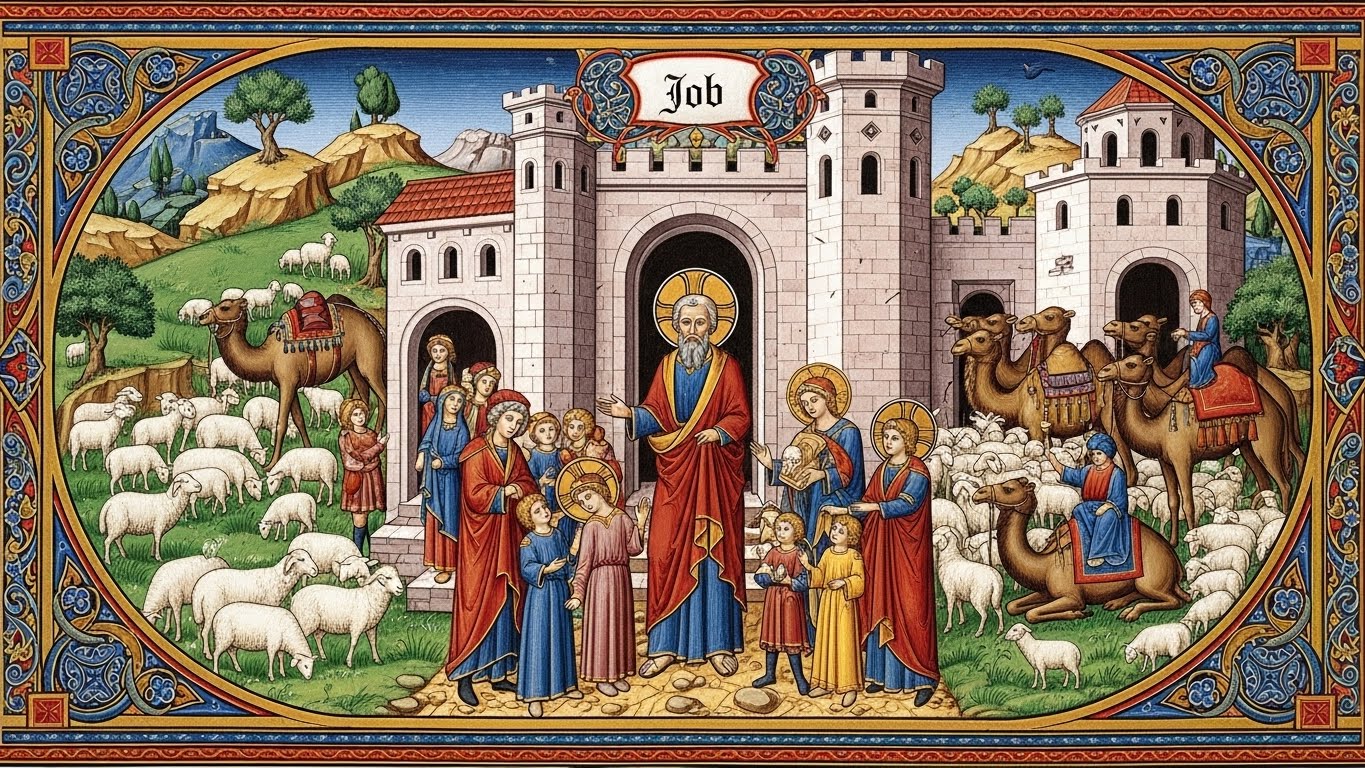Story Of Job – From Integrity To Enduring Suffering

Introduction
Have you ever felt like your life flipped overnight — good days replaced by disasters, blessings by bewildering loss? You’re not alone. The story of Job is one of the oldest and most honest conversations about human suffering and divine purpose. You meet a man who starts life admired for his integrity, then watches everything collapse: family, wealth, and health. Yet Job doesn’t leave you with easy answers; he invites you into raw questions and deeper trust.
Why does this matter to you today? Because everyone faces seasons when faith is tested. Whether it’s the collapse of a relationship, unexpected illness, or the slow erosion of hope, the Story of Job shows you what it looks like to wrestle honestly with God, to hold on to integrity, and to discover how faith can mature through hardship. This is about your Faith in Hard Times — learning how the ancient story speaks into your modern cracks.
The Bible Foundation
Bible Verse: James 1:2–4 (NIV)
“Consider it pure joy, my brothers and sisters, whenever you face trials of many kinds, because you know that the testing of your faith produces perseverance. Let perseverance finish its work so that you may be mature and complete, not lacking anything.”
Link: James 1:2–4 (NIV) — Bible Gateway

The Book of Job sits in the wisdom literature of the Old Testament, and James picks up the theme in the New Testament: trials are not meaningless; they test and refine faith. James is not saying you should be happy about pain in a shallow way. Instead, he invites you to reframe trials as opportunities for spiritual growth — a hard-forged maturity. In Job’s case, his faith is examined from every angle: his reputation, his feelings, his friends’ advice, and his direct dialogue with God. The Bible shows you both the cost and the spiritual benefit of walking through fire with integrity.
Another key verse to see Job’s character is Job 1:1 (NIV):
“In the land of Uz, there lived a man whose name was Job. This man was blameless and upright; he feared God and shunned evil.”
Link: Job 1:1 (NIV) — Bible Gateway
This verse sets the baseline: Job is a man of integrity. That’s important because the story is not about why bad things happen to the unrighteous, but why suffering visits a faithful person.
Understanding the Core Truth
At its heart, the Story of Job teaches that integrity and suffering can coexist, and suffering does not always equal punishment. You need to separate God’s sovereignty from simplistic cause-and-effect thinking. Job’s friends assume suffering must be retribution; the narrative challenges that assumption. Instead, God allows the testing, and through the ordeal, Job’s faith and understanding are stretched.
The main point is simple: God is greater than your suffering, and pain can be a refining, not merely a destroying force. You learn that true faith is not measured by comfort but by endurance, honesty before God, and a willingness to hold questions in one hand and trust in the other. That is central to your Faith in Hard Times.
Going Deeper — The Hidden Meaning

When you dig beneath the surface of Job’s story, you see a layered portrait of spiritual formation. One hidden truth is that God values authenticity. Job doesn’t put on a pious mask; he wrestles, laments, and questions. That very authenticity becomes the soil where deeper faith grows. Another hidden lesson is the danger of easy theological answers. Job’s friends rush to explain suffering with quick theology, which proves spiritually harmful.
Think of a relatable example: imagine you lose a job unexpectedly. People might tell you it’s a blessing in disguise or that you must have done something wrong. Those answers miss the complexity of your pain. Like Job, your hardest work may be learning to sit in the discomfort honestly, bringing it before God without pretending everything is fine. The result — as James promises — is perseverance that leads to greater maturity.
Modern Connection — Relevance Today
The Story of Job matters to your modern life because you live in a world full of unpredictability — health crises, economic collapse, broken relationships, or unanswered prayers. Your culture often pushes quick fixes or catchy platitudes. Job invites you to something truer: honest lament and patient faith.
In families, Job teaches you to listen instead of offering immediate judgment to hurting relatives. At work, his story reminds you that setbacks don’t define your worth before God. In your spiritual life, Job shows you that wrestling with God can deepen, rather than destroy, your relationship with Him. The narrative gives you a framework to hold grief and hope together — a major component of your Faith in Hard Times.

Practical Application — Living the Message
How do you live out Job’s lessons today? Here are simple, practical steps you can start doing now:
- Be honest with God. Bring your questions, anger, and confusion into prayer without fear of being judged. Authenticity fosters growth.
- Practice patient prayer. Ask God for understanding, but also for the patience to wait while He shapes your heart.
- Resist quick theological answers. Before you offer explanations to others, ask compassionate questions and listen.
- Cultivate community wisely. Keep friends who will stay with you in silence and sorrow, not just those who provide platitudes.
- Remember restoration is possible. Job experienced restoration (Job 42:10). Trust that God can bring renewal in ways you may not expect.
These actions help you move from surviving pain to allowing pain to refine you, building a deeper Faith in Hard Times.
Faith Reflection Box
Take a quiet minute: When was the last time you brought a painful question to God and waited for Him to answer? How did that waiting change you?
Key Takeaways
- Be honest with God — faith grows in authenticity.
- Trials can produce spiritual maturity, not just sorrow.
- Avoid simplistic answers; offer listening and presence instead.
- Community matters — choose friends who stay through suffering.
- Hold hope for restoration, anchored in God’s character.
Q&A
Q1: Does Job show that suffering is always a test from God? Answer: Not always in the way you might think. Job’s suffering in the narrative is allowed within God’s sovereignty and does function as a test that reveals the depth of Job’s faith, but the Bible does not say every suffering you face is a specific test God engineered. Scripture balances many causes for suffering — a fallen world, human choices, spiritual consequences, and sometimes God’s permitting for purposes beyond your immediate comprehension. Romans 8:28 reminds you that God works all things together for good for those who love Him (Romans 8:28 — Bible Gateway). Job’s case encourages you to seek God in suffering, not to demand neat explanations.
Related: Perseverance Like Job: Finding Faith in Suffering – Job 1:21 (NIV)
Q2: If you’re faithful, will God protect you from hardship? Answer: The Scriptures do not promise insulation from hardship for faithful people. Jesus Himself warned followers that they would face trials (John 16:33). Instead, God promises presence, comfort, and ultimate purpose in the midst of trials. Hebrews 12:6 notes that God disciplines those He loves, which can be painful but purposeful (Hebrews 12:6 — Bible Gateway). Job’s integrity didn’t spare him pain, but it gave him a platform for deeper intimacy with God. Your faith doesn’t guarantee ease; it guarantees you won’t journey alone.
Q3: Will God always restore what you lost if you endure? Answer: The Bible contains stories of restoration — Job’s fortunes were restored (Job 42:10 — Job 42:10 — Bible Gateway) — but restoration isn’t promised in a one-size-fits-all way. God’s restoration can be material, relational, emotional, or spiritual, and sometimes it looks different than your prior life. The New Testament teaches that present sufferings are temporary compared to future glory (2 Corinthians 4:17 — 2 Corinthians 4:17 — Bible Gateway). Endurance positions you to receive God’s healing in His timing and form. Keep hope, but hold it with humility and surrender.
See also: Job’s Enduring Faithfulness Through Life’s Storms
What Happened to Job? Restoration and Hope
After Job’s honest wrestling and the dialogue with God, Scripture records a turn: God restored Job’s fortunes and gave him twice as much as before. Job 42:10–17 (NIV) says, in part:
“After Job had prayed for his friends, the LORD restored his fortunes and gave him twice as much as he had before. The LORD blessed the latter part of Job’s life more than the former part. He had fourteen thousand sheep, six thousand camels, a thousand yoke of oxen, and a thousand donkeys. He also had seven sons and three daughters. After this Job lived a hundred and forty years; he saw his children and their children to the fourth generation.”
Link: Job 42:10–17 (NIV) — Bible Gateway
This conclusion doesn’t erase Job’s pain, but it shows God’s compassion and capacity for restoration. You can hold fast to the hope that God sees your pain and can bring renewal in His time.
Conclusion & Reflection
The Story of Job takes you from integrity into suffering and back toward renewal, not through easy answers but through candid relationship with God. Your Faith in Hard Times isn’t about achieving a stoic silence; it’s about showing up, asking hard questions, refusing shallow comfort, and trusting that God is both sovereign and tender. Let Job’s honesty inspire you to bring your hardest questions to God and to allow those questions to refine your faith.
A short prayer: Lord, in seasons of loss and confusion, help me be honest with You. Give me patience to wait, ears to listen, and courage to hold both doubt and trust. Make my faith deep, not merely comfortable. Amen.

More Inspiration Awaits — Read These Next
👉 For deeper insight into Isaiah 40:31 and how it renews your strength in both faith and daily life
👉 For practical lessons on compassion and neighborliness from the Good Samaritan
👉 For a clear explanation of what we can learn from the Parable of the Good Samaritan
👉 For meaningful insights from the Parable of the Pearl and its hidden treasures
👉 For a deeper look at the Rich Man and Lazarus and what it reveals about the afterlife
👉 For guidance on the Parable of the Ten Virgins and preparing for God’s Kingdom
👉 For clarity on the Parable of the Lamp and how it calls us to shine our light
👉 For insights from the Parable of the Wedding Feast and the meaning behind the invited guests

📘 Jesus and the Woman Caught in Adultery – Grace and Mercy Over Judgement
A powerful retelling of John 8:1-11. This book brings to life the depth of forgiveness, mercy, and God’s unwavering love.
👉 Check it now on Amazon 🛒💥
🔥 “Every great message deserves a home online.” 🌍💬🏡
Don’t let your calling stay hidden. Start a Christian blog or website using Hostinger — with 99.9% uptime, a free domain, and SSL, your voice can shine for God’s glory anytime, anywhere.
💥 Begin today. 🛒 Try it RISK-FREE! ✅
✝️ “Your body is God’s temple — care for it with purpose.” 💪💖🏛️
Renew your energy and restore balance naturally. Mitolyn helps support a healthy metabolism, giving you the vitality to live out God’s calling with strength and confidence.
🔥 Unlock Your Metabolic Power! ⚡Burn More Calories & Feel Great With Mitolyn. 💪
👉 Start Today. 🚀 Check Price Now. 🛒💰
💰 As a ClickBank & Amazon Affiliate, I earn from qualifying purchases.
📖 Acknowledgment: All Bible verses referenced in this article were accessed via Bible Gateway (or Bible Hub).
🚀 Want to explore more? 👉 Dive into our new post on Why Jesus? and experience the 🔥 life-changing truth of the Gospel!








